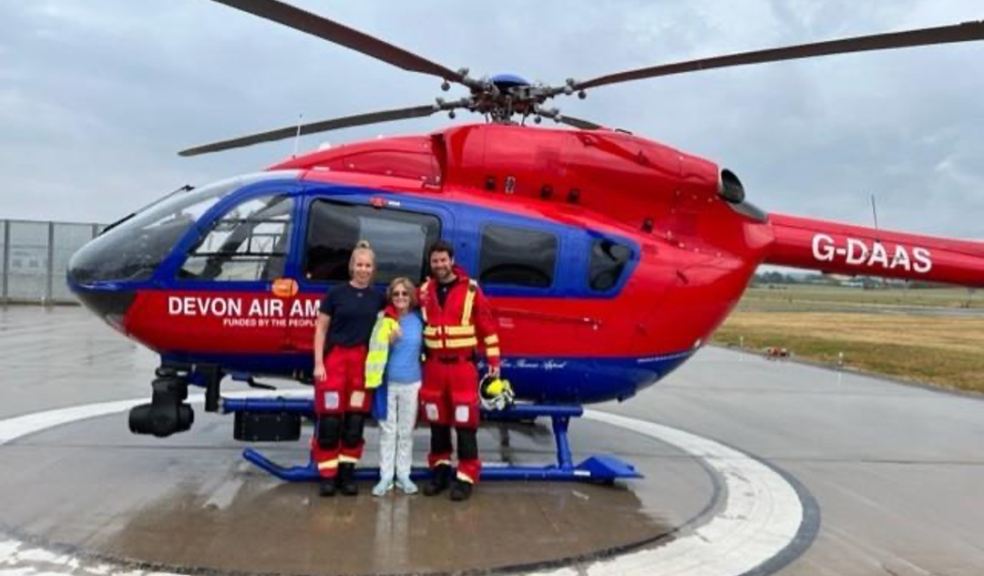
Devon Air Ambulance paramedic recounts the moment she met Devon Air Ambulance founder
Devon Air Ambulance Critical Care Paramedic recounts the moment she met their founder Ann Ralli for the first time.
Jessica Thomas-Mourne explains in her own words, her personal reaction and her utmost compassion for an awe-inspiring, pioneering mother.
“Earlier this year I arrived early for work and walked into the airbase crew room for the start of my late shift. I was met by a huddle of colleagues deep in conversation with a woman that I didn’t recognise.
There are often unfamiliar faces at the airbase including clinical observers, former patients and their loved ones, or aviation experts, yet few are hosted by our Chief Executive, so I knew that this woman was someone important. Our Head of Communications introduced me to our Founder, Ann Ralli.
Ann and I shook hands before sitting down to talk. Every employee at Devon Air Ambulance is aware of our charity origins following the tragic death of Ann’s beloved son, Ceri, who was killed on his pushbike back in 1986. However, hearing this bereaved mother candidly relay her personal experience made my heart break.
Ann explained that when she had asked a hospital surgeon if anything could have saved her son’s life, she was told that only an air ambulance getting Ceri to hospital sooner could have afforded him a chance of survival; subsequently, Ann began fundraising for a helicopter in Devon.
Working with trauma
In my career, I have unfortunately attended hundreds of road traffic collisions where I and my colleagues have worked tirelessly with other emergency services to try and save the lives of our patients.
We have witnessed devastation and heard the primal wails of despair from a patient’s family or friends as they arrive on scene and realise that the situation is real.
We’ve broken bad news countless times to loved ones and watched the light of hope disappear from their eyes, like blowing out a candle. I thought about one RTC almost a decade ago where an eighteen-year-old motorcyclist had collided with a tree and tragically died despite extensive resuscitation efforts.
At this incident I discovered a necklace that had been torn from his neck; engraved upon the necklace was ‘we love you, son’. At the time I thought about the parents of this patient the police were about to visit. I cannot imagine that conversation, one that Ann would also have had.
Ann spoke of her experience of standing in front of ‘anyone who would listen’ and asking for support, financial or otherwise. She relayed tales of the opposition she faced thirty years ago, sharing the humiliating and derogatory comments received from men in the health authority back then as they sneered and asked, ‘How are you going to fund an air ambulance, by making jam?’
I could empathise to a degree with Ann about being a woman in a man’s world. HEMS (Helicopter Emergency Medical Service) can be a lonely place for women, part of the reason why I elected to research what is causing the current gender imbalance in HEMS nationally as my final MSc dissertation. I shared the fundamental findings of my research with Ann and she grabbed my forearm in a fiercely caring kind of way and beamed at me, ‘You go, girl!’.
Founding an ever-changing service
While we were talking, the red phone rang. We all know that means someone in Devon or a neighbouring county needs our urgent help. My colleagues took brief incident details, gathered our multitude of phones, iPads, helmets, high-vis jackets and the Lyoplas bag containing our blood products from the fridge before heading out to the aircraft.
I asked Ann if she’d like to come outside and see her helicopter depart up close and she jumped at the chance, so we walked out into the British drizzle and stood side-by-side as the rotor blades started turning, the engines started roaring, and my colleagues prepared to lift-off.
We heard the engine pitch change and the aircraft lifted into a hover before dipping the nose down and swooping off into the distance. I felt wholesome astonishment as I stood next to a person who had channelled their grief to fundraise millions of pounds for a helicopter; the manifestation of a parent’s love.
Ann and I returned to the warm airbase to collect her things and I offered to drive her to the airbase gate in our Critical Care Car. I shared with Ann how our cars carry the same kit on board as our helicopters and that we now crew the cars in conjunction with the aircraft to be able to help more patients.
Before we said our farewells, I thanked Ann for everything she had done and expressed my complete awe. I said to Ann that if I am just a fraction of the parent she is, my daughter would be very lucky indeed."
If you have felt inspired by Jess' account and are able to help support the vital work of Devon Air Ambulance, it's not too late to donate to their Christmas appeal here: https://www.daat.org/Appeal/all-we-want-for-christmas











